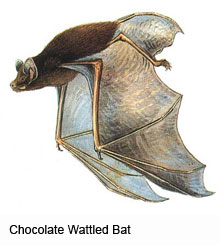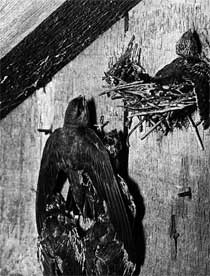Crocodiles: Nile Crocodiles are vital to their ecosystems because they keep certain other animal populations in check. Nile Crocodiles are at the top of the food chain, and maintain balance in their ecosystem by keeping Barbell Catfish populations in check.

If the crocs were to suddenly disappear from the Nile, the catfish population might multiply! Since catfish have strong appetites, they would wipe out other fish populations that are valuable sources of food for over 40 different types of birds. Crocs are also scavengers that feed on carcasses, keeping their habitat clean!
 Bats: There are an enormous number of bat species, almost 1,000 currently living all in most temperate and tropical regions around the world. Since there are only 4,000 species of mammal, bats make up about one quarter of all mammal species! Bats are essential to the world's ecosystem, consuming between 3,00 and 5,000 kinds of crop pests, and dispersing seeds and pollinating over 450 plant products. Bats: There are an enormous number of bat species, almost 1,000 currently living all in most temperate and tropical regions around the world. Since there are only 4,000 species of mammal, bats make up about one quarter of all mammal species! Bats are essential to the world's ecosystem, consuming between 3,00 and 5,000 kinds of crop pests, and dispersing seeds and pollinating over 450 plant products.
Bats' natural predators include owls, hawks, peregrine falcons, cats, and humans. Excessive use of pesticides in agriculture is also a grace source of danger for bat populations. The bats eat insects contaminated with pesticides,
and die from the poison. In addition, roosting sites and feeding grounds are being transformed to make way for buildings and roads. Slowly but surely, as scientists discover more and more about these essential pest controllers, countries around the world are passing laws to protect bats and their habitats.
 Coral: Coral reefs are made of the exoskeletons of many tiny invertebrates called polyps, which are related to jellyfish. Coral: Coral reefs are made of the exoskeletons of many tiny invertebrates called polyps, which are related to jellyfish.
These reefs provide essential habitats to more than one fourth of all marine animals, including fish, anemones, crustaceans, and sponges. Coral reefs also benefit humans by protecting shore-side communities from strong waves and storms.
Unfortunately, runoff from farms, roads, and ocean-side construction destroys these delicate reef ecosystems.
Swifts: Swifts are incredibly beneficial residents in any city. Why? They can eat one third of their weight each day in mosquitoes, biting flies and flying ants! In one day, a flock of swifts can catch up to 40,000 flying insects!
 Swifts will cause no harm to property and leave little mess. In fact, the area surrounding swifts nests are very clean because the parent birds eat the chicks' droppings (to recycle mineral content). Have no fear, and allow the birds to use your chimney as their home. Swifts will cause no harm to property and leave little mess. In fact, the area surrounding swifts nests are very clean because the parent birds eat the chicks' droppings (to recycle mineral content). Have no fear, and allow the birds to use your chimney as their home.
In Europe, particularly Britain, swift populations are falling fast. Between 1994
and 2003, England lost 29% and Scotland lost 62% of their swift populations!
Local governments in Amsterdam, Basel, Edinburgh, and Zurich have successfully taken action to maintain their swift populations. British cities must do the same, or loose these fascinating winged residents.
|

